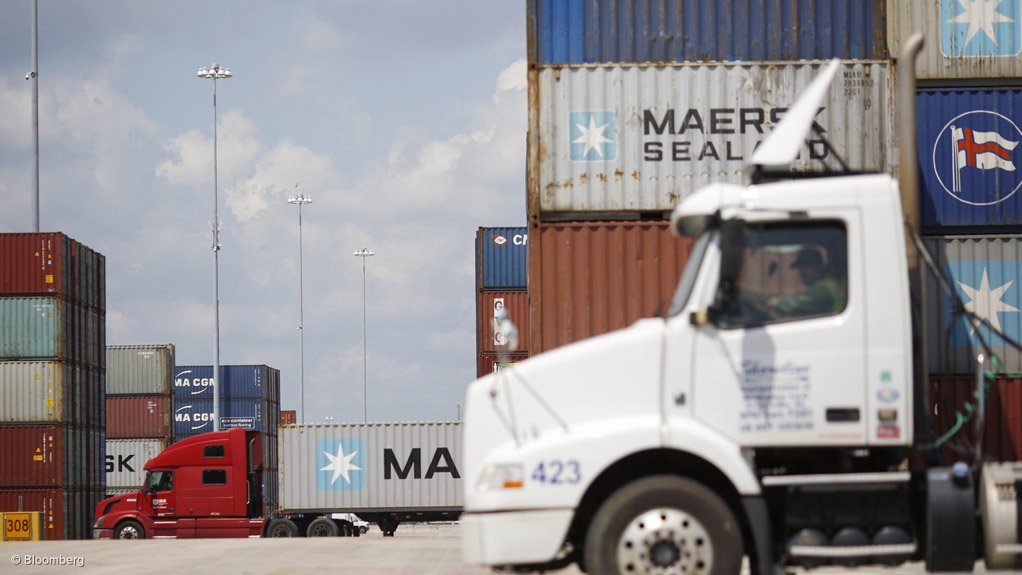Technology to aid fleet management



DERESHIN PILLAY The influence of technology on fleet management is important for industry growth and consumer satisfaction
RELIABLE DELIVERY Innovative logistics technologies allow for real-time estimates for warehouses anticipating deliveries
Photo by Bloomberg
South Africa-based, international information technology and communications provider T-Systems says technological improvements in sensors, software and management solutions indicate that commercial vehicle owners, such as fleet management and logistics organisations using trucks and bakkies, can increasingly get the most out of their assets.
The company believes that this is attributable to real-time vehicle tracking, smart maintenance, and increased vehicle connectedness and intelligence.
“There has been significant progress in technology and this now plays a central role in the automotive industry. Companies now have the benefit of knowing where a vehicle is at any time using intelligent logistics systems. These systems can analyse incoming data, such as weather and traffic patterns, and divert the vehicle to use the shortest possible route,” says T-Systems manufacturing and automotive head Dereshin Pillay.
He adds that these new logistics technologies are also useful at docks, as warehouses awaiting the arrival of goods will have real-time and updated information on the goods. This will ensure that the right equipment and personnel are on hand to receive the goods.
In addition, vehicle manufacturers can better manage the parking bays on the dock housing a fleet of new vehicles waiting for shipment.
Changes in Industry
Commercial vehicles, including trucks and bakkies, are also steadily becoming more autonomous, with improving technologies built into vehicles by original-equipment manufacturers (OEMs), says Pillay. Technology has benefited the automotive industry most significantly in the last two to three years.
Owing to this, there is currently an influx of devices that allow for after-sales predictive maintenance, with these solutions informing owners and OEMs what needs to be done in terms of parts conditioning or replacement. This is to prevent downtime or more expensive maintenance at a later stage, which influences the value chain.
For example, on-board diagnostics ramps up a vehicle’s self-diagnostic and reporting capability, monitoring several components and their performance while providing greater access into vehicles for OEMs, adds Pillay.
He explains that a vehicle owner would receive a call from a truck fleet manager advising that diagnostics on the vehicle are reporting a fault, and that the driver should consult a repair facility, which, in turn, would be loaded into the vehicle’s global positioning system.
The dealer would be able to advise the driver on any possible changes in vehicle behaviour and what action to take. The truck or bakkie fleet manager can then dispatch a courtesy car and repair crew with the correct equipment to repair the vehicle. This technology would increase communication between truck dealers, fleet managers and vehicle owners, making for safer and more convenient fleet maintenance options.
For truck fleet owners, Pillay highlights two challenges – managing maintenance costs and planning maintenance budgets. Timeous repair can save fleet owners 80% of these costs, with technology enabling them to track vehicle location and condition, as well as scheduled maintenance and the type of maintenance required. “This enables owners to plan and budget more efficiently and will maximise fleet use.”
Truck fleet owners must be informed as to what assets are operational at any time. For OEMs, it can be a challenge to ensure that the right stockholding of parts is kept, as they do not always know what parts will need replacing, says Pillay.
Predictive maintenance will eliminate these challenges for fleet owners and OEMs, with truck fleet owners able to keep track of the performance and availability of their assets, enabling them to predict maintenance costs and better maintain fleets, explains Pillay. OEMs will be able to predict what parts must be stocked for vehicle maintenance. Client satisfaction and returns will, therefore, be significantly increased.
Future of Commercial Vehicle Technology
Pillay predicts that automotive technology will impact on the entire value chain of trucks and bakkies. Technology enables the value chain to become more cost effective, thereby reducing costs to consumers. This does, however, make it integral that truck and bakkie fleet owners and managers who wish to remain competitive begin exploring how they can add value, grow efficiencies and maximise fleet use, he emphasises.
As such, Pillay says organisations who have not adopted new technologies from 2020 onwards will become irrelevant. “At present, 20% to 25% of the automotive industry has adopted some form of technology. Of these, 5% to 10% have invested in most of the available technologies.”
Organisations will also have to consider how technologies will impact on the workforce and the skills they will need to acquire, as well as company risk profiles. Autonomous trucks and bakkies and the infrastructure required to accommodate them will further impact on the value chain, with system security and liability needing to be reassessed, Pillay advises.
Implementing technology in trucks and bakkies will allow for better logistics and asset management, as well as maximising the use of assets, he reiterates, adding that technology and information will be shared as ecosystems begin to form around key client segments. Driving outcome-based services delivered collaboratively by multiple partners will benefit customers and vehicle and fleet owners, he concludes.
Article Enquiry
Email Article
Save Article
Feedback
To advertise email advertising@creamermedia.co.za or click here
Press Office
Announcements
What's On
Subscribe to improve your user experience...
Option 1 (equivalent of R125 a month):
Receive a weekly copy of Creamer Media's Engineering News & Mining Weekly magazine
(print copy for those in South Africa and e-magazine for those outside of South Africa)
Receive daily email newsletters
Access to full search results
Access archive of magazine back copies
Access to Projects in Progress
Access to ONE Research Report of your choice in PDF format
Option 2 (equivalent of R375 a month):
All benefits from Option 1
PLUS
Access to Creamer Media's Research Channel Africa for ALL Research Reports, in PDF format, on various industrial and mining sectors
including Electricity; Water; Energy Transition; Hydrogen; Roads, Rail and Ports; Coal; Gold; Platinum; Battery Metals; etc.
Already a subscriber?
Forgotten your password?
Receive weekly copy of Creamer Media's Engineering News & Mining Weekly magazine (print copy for those in South Africa and e-magazine for those outside of South Africa)
➕
Recieve daily email newsletters
➕
Access to full search results
➕
Access archive of magazine back copies
➕
Access to Projects in Progress
➕
Access to ONE Research Report of your choice in PDF format
RESEARCH CHANNEL AFRICA
R4500 (equivalent of R375 a month)
SUBSCRIBEAll benefits from Option 1
➕
Access to Creamer Media's Research Channel Africa for ALL Research Reports on various industrial and mining sectors, in PDF format, including on:
Electricity
➕
Water
➕
Energy Transition
➕
Hydrogen
➕
Roads, Rail and Ports
➕
Coal
➕
Gold
➕
Platinum
➕
Battery Metals
➕
etc.
Receive all benefits from Option 1 or Option 2 delivered to numerous people at your company
➕
Multiple User names and Passwords for simultaneous log-ins
➕
Intranet integration access to all in your organisation




















